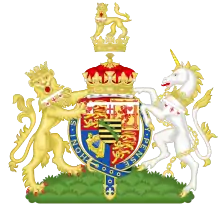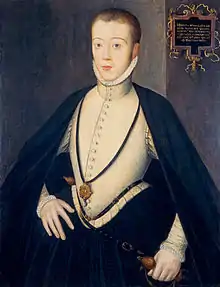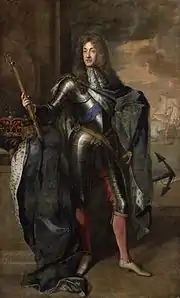Duke of Albany
Duke of Albany was a peerage title that has occasionally been bestowed on the younger sons in the Scottish and later the British royal family, particularly in the Houses of Stuart and Hanover.
| Dukedom of Albany | |
|---|---|
 | |
| Creation date | 24 May 1881 |
| Creation | Sixth |
| Monarch | Queen Victoria |
| Peerage | Peerage of the United Kingdom |
| First holder | Prince Leopold |
| Last holder | Prince Charles Edward |
| Remainder to | the 1st Duke's heirs male of the body lawfully begotten |
| Subsidiary titles | Earl of Clarence Baron Arklow |
| Status | Suspended under the Titles Deprivation Act 1917 on 28 March 1919 |

History
The Dukedom of Albany was first granted in 1398 by King Robert III of Scotland on his brother, Robert Stewart, the title being in the Peerage of Scotland. "Albany" was a broad territorial term representing the parts of Scotland north of the River Forth, roughly the former Kingdom of the Picts. The title (along with the Dukedom of Rothesay) was the first Dukedom created in Scotland. It passed to Robert's son Murdoch Stewart, and was forfeited in 1425 due to the attainder of Murdoch.
The title was again created in 1458 for Alexander Stewart but was forfeit in 1483. His son John Stewart was restored to the second creation in 1515 but died without heirs in 1536. In 1541 Robert, second son of James V of Scotland, was styled Duke of Albany, but he died at less than a month old. The fourth creation, along with the Earldom of Ross and Lordship of Ardmannoch, was for Mary, Queen of Scots' king consort Lord Darnley, whose son, later James VI of Scotland, I of England and Ireland, inherited the titles on his death. That creation merged with the Scottish crown upon James's ascension. The title, along with the title of Duke of York, with which it has since been traditionally coupled, was created for a fifth time in 1604 for Charles, son of James VI and I. Upon Charles's ascent to the throne in 1625, the title of Duke of Albany merged once again in the crowns.
The title was next granted in 1660 to Charles I's son, James, by Charles II. When James succeeded his elder brother to the throne in 1685, the titles again merged into the crown. The cities of New York and Albany, New York, were thus both named after James, as he was the Duke of York and of Albany. The pretender, Charles Edward Stuart, gave the title Duchess of Albany to his illegitimate daughter Charlotte; she died in 1789.
The title "Duke of York and Albany" was granted three times by the Hanoverian kings.

The title of "Albany" alone was granted for the fifth time, this time in the Peerage of the United Kingdom, in 1881 to Prince Leopold, the fourth son of Queen Victoria.[1] Prince Leopold's son, Prince Charles Edward (who had succeeded as reigning Duke of Saxe-Coburg and Gotha in 1900), was deprived of the peerage in 1919 for bearing arms against the United Kingdom in World War I.[1] His grandson, Ernst Leopold (1935–1996), only son of Charles Edward's eldest son Johann Leopold, Hereditary Prince of Saxe-Coburg and Gotha (1906–1972), sometimes used the title "Duke of Albany",[1] although the Titles Deprivation Act 1917 stipulates that any successor of a suspended peer shall be restored to the peerage only by direction of the sovereign, the successor's petition for restoration having been submitted for and obtained a satisfactory review of the appropriate Privy Council committee.[2]
Dukes of Albany
First creation, 1398
- Other titles (1st Duke): Earl of Fife (1371), Earl of Buchan (1374–1406), Earl of Atholl (1403–1406)
- Robert Stewart, 1st Duke of Albany (c. 1340–1420), third son of Robert II
- Other titles (2nd Duke): Earl of Menteith (bef 1189), Earl of Fife (1371), Earl of Buchan (1374)
- Murdoch Stewart, 2nd Duke of Albany (1362–1425), eldest son of the 1st Duke was attainted and his honours forfeit in 1425
Second creation, 1458
- Other titles (1st Duke): Earl of March (1455), Earl of Mar and Earl of Garioch (1482)
- Alexander Stewart, 1st Duke of Albany (c. 1454–1485), second son of James II, forfeited his honours in 1479, was restored in 1482, then forfeited them again in 1483
- Other titles (2nd Duke): Earl of March (1455)
- John Stewart, 2nd Duke of Albany (1481–1536), only legitimate son of the 1st Duke, was restored to his father's dukedom and Earldom of March in 1515. The honours became extinct upon his death without issue
Only styled, 1541
| Duke | Portrait | Birth | Marriages | Death |
|---|---|---|---|---|
| Robert Stewart House of Stuart 1541–1541 |
no portrait | 12 April 1541 Falkland Palace, Falkland son of King James V and Queen Mary |
not married | 20 April 1541 Falkland Palace, Falkland aged 8 days |
Third creation, 1565
| Duke | Portrait | Birth | Marriages | Death |
|---|---|---|---|---|
| Henry Stuart House of Stuart 1565–1567 also: Earl of Ross and Lord Ardmannoch (1565) |
 |
19 November 1545 Dunfermline Palace, Dunfermline son of Matthew Stewart and Lady Margaret Douglas |
Mary, Queen of Scots 29 July 1565 1 child |
10 February 1567 Kirk o' Field, Edinburgh aged 21 |
| James Stuart House of Stuart 1567 also: Earl of Ross and Lord Ardmannoch (1565); Duke of Rothesay (1398) |
 |
19 June 1566 Edinburgh Castle, Edinburgh son of Mary, Queen of Scots and Henry Stuart, Duke of Albany |
Princess Anne of Denmark 29 July 1565 9 children |
27 March 1625 De Vere Theobalds Estate, Cheshunt aged 58 |
| Prince James succeeded as James VI in 1567 upon his mother's abdication, and his titles merged with the crown. | ||||
Fourth creation, 1600
| Duke | Portrait | Birth | Marriages | Death |
|---|---|---|---|---|
| Charles Stuart House of Stuart 1600–1625[3] also: Marquess of Ormond, Earl of Ross, Lord Ardmannoch (1600–1625); Duke of York (1605–1625); Prince of Wales (1616), Duke of Cornwall (1337) and Duke of Rothesay (1398) |
.jpg.webp) |
19 November 1600 Dunfermline Palace, Dunfermline son of King James I and Queen Anne |
Henrietta Maria of France 13 June 1625 9 children |
30 January 1649 Whitehall Palace, London aged 48 |
| Prince Charles succeeded as Charles I in 1625 upon his father's death, and his titles merged with the crown. | ||||
Fifth creation, 1660
| Duke | Portrait | Birth | Marriages | Death |
|---|---|---|---|---|
| James Stuart House of Stuart 1633/1644–1685[4] also: Duke of York (1633/1644), Earl of Ulster (1659) |
 |
14 October 1633 St. James's Palace, London son of King Charles I and Queen Henrietta Maria |
Anne Hyde 3 September 1660 8 children Mary of Modena 21 November 1673 7 children |
16 September 1701 Château de Saint-Germain-en-Laye, Paris aged 67 |
| Prince James succeeded as James II in 1685 upon his brother's death, and his titles merged with the crown. | ||||
Sixth creation, 1881
| Duke | Portrait | Birth | Marriages | Death |
|---|---|---|---|---|
| Prince Leopold House of Saxe-Coburg and Gotha 1882–1884 also: Earl of Clarence and Baron Arklow (1881) |
 |
7 April 1853 Buckingham Palace, London son of Queen Victoria and Prince Albert |
Princess Helena of Waldeck and Pyrmont 27 April 1882 2 children |
28 March 1884 Villa Nevada, Cannes aged 30 |
| Prince Charles Edward House of Saxe-Coburg and Gotha 1884–1919 also: Earl of Clarence and Baron Arklow (1881) |
 |
19 July 1884 Claremont, Esher son of Prince Leopold and Princess Helena |
Princess Victoria Adelaide of Schleswig-Holstein 11 October 1905 5 children |
6 March 1954 Coburg aged 69 |
| The Titles Deprivation Act 1917 suspended the title on 28 March 1919. | ||||
Family tree
Dukes of Albany in fiction
- Thomas Norton and Thomas Sackville's play Gorboduc includes Fergus, the Duke of Albany, who tries to claim the British throne after Gorboduc's death through his royal descent.
- William Shakespeare's King Lear includes as a major character the Duke of Albany, who is husband to Lear's daughter Goneril.
- In the 2001 film Kate & Leopold, Leopold is the Duke of Albany, presumably meant to be the same person as the historic Prince Leopold, Duke of Albany, who would have held the title at that time, as the fictitious character comments that his surname is Mountbatten (a later surname of the British royal family, which is an Anglicised version of the German surname Battenberg).
References
- Eilers, Marlene (1997). Queen Victoria's Descendants. Falkoping, Sweden: Rosvall Royal Books. pp. 106–108, 160–162, 164–165, 179–180. ISBN 91-630-5964-9.
- "Titles Deprivation Act 1917". The National Archives. 1917. Retrieved 13 March 2019.
- Gregg, Pauline (1981), King Charles I, London: Dent
- Callow, John, The Making of King James II: The Formative Years of a King, Sutton Publishing, Ltd, Stroud, Gloucestershire, 2000. Page